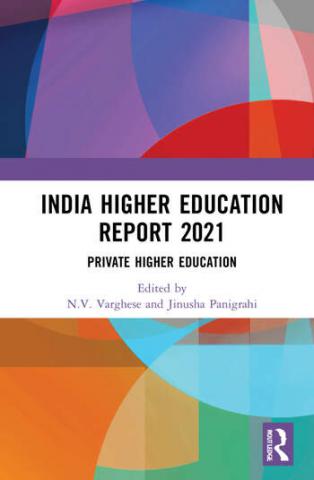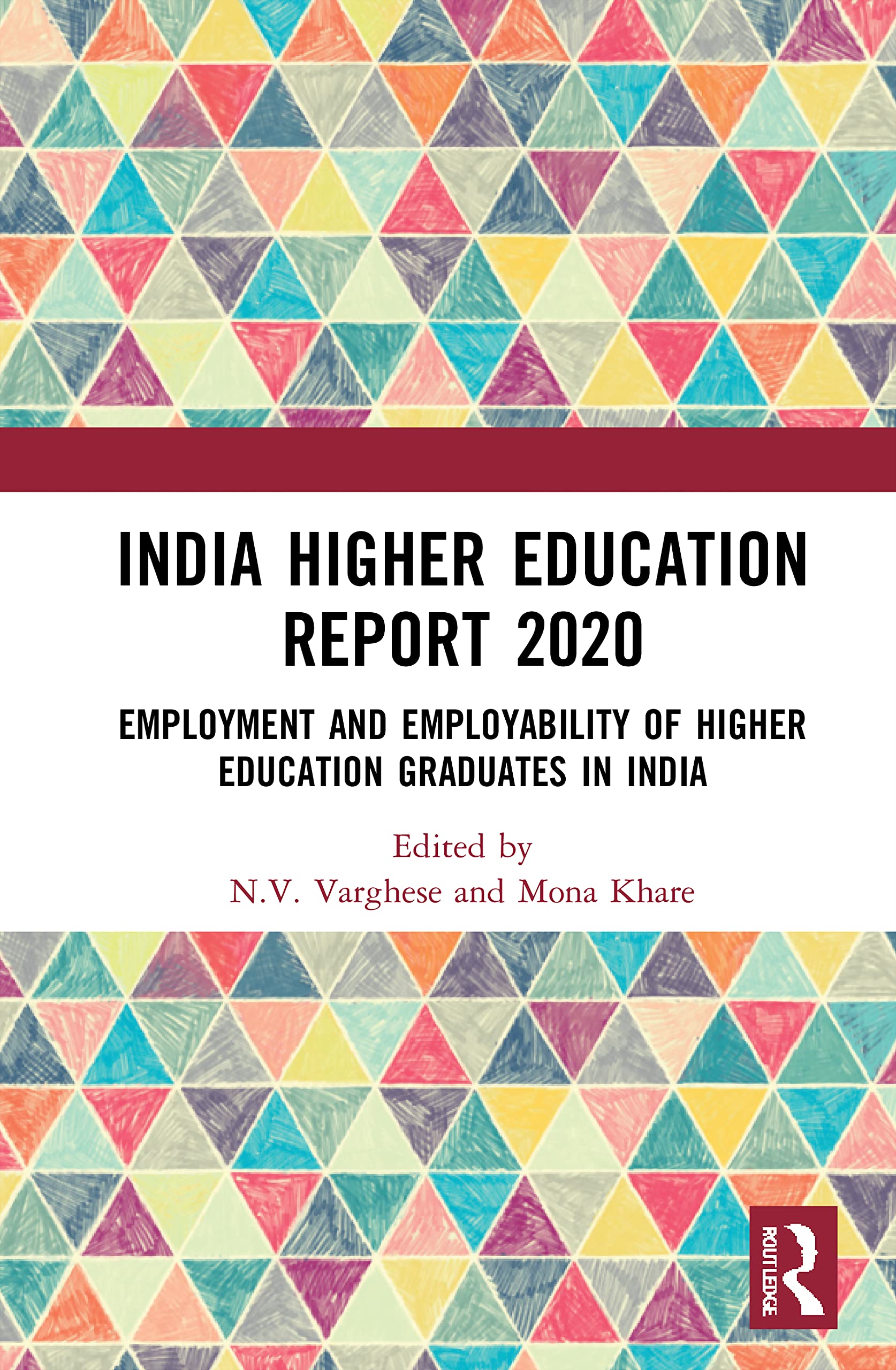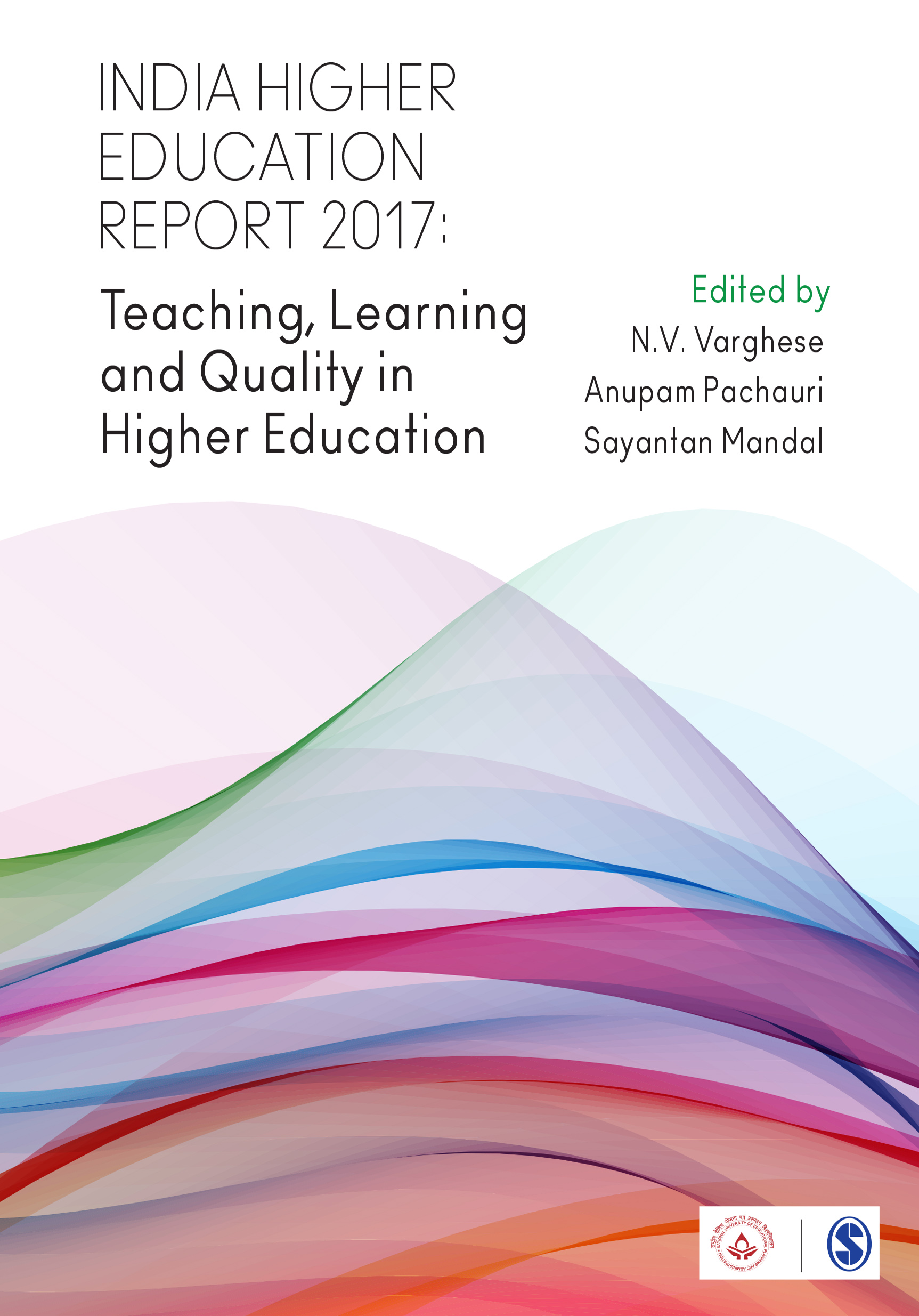IHER
CPRHE/NIEPA has initiated a publication on India higher education entitled ‘India Higher Education Report’ (IHER). The IHER aims to focus on the current issues and challenges facing the higher education sector in India. It is envisaged that IHER may become an annual publication and serve as a good reference document for researchers and policymakers in India.
INDIA HIGHER EDUCATION REPORT 2022: Women in Higher Education (Edited by N. V. Varghese and Nidhi S. Sabharwal)
INDIA HIGHER EDUCATION REPORT 2022
This book studies the various dimensions of gender inequality that persist in higher education and employment in India. It presents an in-depth analysis of the complex challenges women face in higher education participation and in translating higher education opportunities into labour market success and into leadership positions, including in academia. It argues that despite substantial progress towards gender equality in enrolment, these inequalities act as barriers to realising the transformative role that higher education can have for women’s well-being and for the nation’s development. The volume looks at the issues that keep women from accessing the areas of their choice, and the challenges they face in leadership positions in higher education. An important critique of higher education policy and planning, the volume will be of interest to teachers, students and researchers of education, public policy, political science and international relations, economics, feminism, women’s studies, gender studies, law and sociology. It will also be useful for academicians, policymakers and anyone interested in the study of gender in Indian Higher Education.
i) Women in Higher Education: an overview
Part I Women, education and development
ii) Education, development and employment: the ongoing crisis in women's employment and its revelations
Part II Women's access to HE and their educational inter-generational mobility
iii) Women enrolment in higher education
iv) Access to higher education of women from disadvantaged groups and minorities 67
v)From gender parity to gender prism: looking beyond enrolment parity to explore gendered conditions of access to higher education in Haryana, India
vi)Gender, inter-generational mobility and higher education
Part III Women's field of study, representation in research programmes and career trajectories
vii)Higher education, career and women entrepreneurship: between compulsion and choice
viii)Gendered academic trajectories through research and publication: influences and implications
ix)Women in science education and science careers in India
Part IV Women in academic profession and leadership positions in higher education
x)Structures of exclusion: promotion procedures and gender inequality in the professoriate in India
xi)Women in leadership in higher education: opportunities, challenges and the way forward
xii)Women in leadership in higher education: narratives from the field
xiii)Women in leadership: exploring the barriers and facilitators in the Indian higher education sector
Part V Gender-responsive policies and HEI strategies for inclusion on campuses
xiv)Implementing the sexual harassment law within higher education: a qualitative enquiry
xv)Gendering pedagogy, engendering practices: contemporary STEM education
For more detail Visit : Routledge
 INDIA HIGHER EDUCATION REPORT 2021
INDIA HIGHER EDUCATION REPORT 2021
This volume provides an in-depth analysis of the critical dimensions of higher education in India. It focuses on the growth and expansion of private higher education and public policy. The volume discusses issues related to the growth of for-profit and not-for-profit private higher education institutions and their implications at the policy level. It outlines the role of such institutions towards the internationalization and global ranking of the Indian higher education system. The book discusses the trends in internationalisation adopted by private higher education institutions and explains the resulting impact on aspects such as the diversity of programs, skill formation, employability, pedagogic practices, standards, curriculum development, and research and development, as well as the wider externalities in terms of promoting India’s soft power and international relations with other countries. While outlining the challenges of Open Distance Learning (ODL) and online education in India, the book also discusses the use of ICT, OER, and MOOCS among others to address the challenges of the ODL system. This volume will be of interest to teachers, students, and researchers of education, public policy, political science, international relations, law, sociology, economics, and political economy. It will also be useful for academicians, policymakers, and anyone interested in the internationalization of Indian Higher Education.
i) Private Higher Education: An Overview Part I Growth and Expansion of Private Higher Education in India
ii) For–Profit and Non–Profit Private Higher Education Institutions in India
iii) Role of Private Higher Education Institutions in Internationalization of Higher Education
iv)The Rise Of “Elite” Private Universities in India: A Case Study
Part II Private Higher Education Institutions: Technical & Professional
v)Private Sector in Professional Education
vi)Private Sector in Management Education
vii)Private Sector in Medical Education and Allied Health Disciplines
viii)Privatization of ODL And Online Education in India: Perspectives and Challenges
Part III Quality, Excellence, And Regulations of Private Higher Education
ix)Quality Assurance and Private Higher Education in India
x)Law Governing Private Universities in India: Minimum Standards to Enabling Frameworks?
xi)Institutional Autonomy in Private Universities in India
Part IV Financing of Private Higher Education and Concerns for Equity
xii)Affordability & Equity Concerns in Private Higher Education Institutions
xiii)Financing of Private Higher Education Institutions in India
For more detail Visit : Routledge
INDIA HIGHER EDUCATION REPORT 2020: Employment and Employability of Higher Education Graduates in India (Edited by N. V. Varghese and Mona Khare)
 INDIA HIGHER EDUCATION REPORT 2020
INDIA HIGHER EDUCATION REPORT 2020
India Higher Education Report 2020 critically analyzes the role played by the state, industries, and higher education institutions in the employment and employability of educated youth in India. The book discusses a wide range of topics such as employability skill gaps of higher education graduates; curriculum and skills training systems; formal and informal modes of skill formation; crisis of jobless growth in India; migration, education and employment; dimensions of gender, caste and education; general, technical and professional education; vocationalization; qualifications framework and skills certifications; curriculum and pedagogy in higher education for skill development; industry–academia linkages; entrepreneurship education and executive education; and sustainable employment.
i) Employment and employability of higher education graduates: an overview
ii) The crisis of jobless growth in India
iii) On the persistence of informal work and self-employment in India
iv)Migration, education and employment in India
v)Declining labour force participation in India: does education and training help?
vi)Trends in employment and unemployment in India: dimensions of gender, caste and education
vii)Skills mismatch of higher education graduates in India: factors determining employability quotient
viii)General, technical and professional education: employability skill gaps
ix)Education, skills mismatch and wage differentials
x)India’s national skills qualification framework and employment: the promise and the reality
xi)Curriculum and pedagogy in higher education for skill development
xii)Skilling India: vocational orientation to higher education
xiii)Skill universities in India
xiv)Informal modes of skill formation
xv)Industry–academia linkages in India’s technical education sector
xvi)Refuelling entrepreneurship education in India: a case study
xvii)Executive education and career advancement: sustainable employment
For more detail Visit : Routledge
INDIA HIGHER EDUCATION REPORT 2019: Governance and Management of Higher Education in India (Edited by N. V. Varghese and )
INDIA HIGHER EDUCATION REPORT 2019
Governance in education is well recognized as critical to institutional performance and effectiveness. Governance and Management of Higher Education in India is the fifth book in the series India Higher Education Report initiated by the Centre for Policy Research in Higher Education, National Institute of Educational Planning and Administration. The book examines macro issues of governance, focusing on the role of the state and market, regulation at national and state levels, and accountability measures. It also looks at institutional issues of autonomy, affiliation, teacher recruitment, and managing quality and excellence. The discussions in the book centre on theoretical perspectives and empirical evidences. The volume will be an important resource for academics, policy makers as well as scholars and researchers of public policy, political science and economics.
i) Governance of Higher Education in India: An Introduction
ii) State, Market and Governance of Higher Education
iii) Regulation of Higher Education in India
iv)The State Councils of Higher Education: A Case for Strengthening Intermediary Agencies
v)Accountability Measures to Improve Governance
vi)Governance and Management of Affiliated Colleges
vii)Management of Autonomous Colleges: A Movement from Academic Colonialism to Freedom and Democratization of Higher Education
viii)Governance and Autonomy: A Study of Central and State Universities
ix)Governance and Management of Higher Education at the Institutional Level: Reality, Concerns and Transmutation
x)Managing Transition from ‘State’ to ‘Central’ University in the University of Allahabad: Issues and Challenges
xi)Managing Quality and Excellence: Conceptual and Institutional Factors
xii)Managing Quality and Excellence at the Institutional Level: A Study of Bharathiar University
xiii)The Political Economy of Governance in Higher Education: Temporary Teachers Phenomenon
xiv)Leveraging Technology to Solve the Pentagon Puzzle of Higher Education in India
xv)Managing Student Diversity in Indian Higher Education Institutions: Achieving Academic Integration and Social Inclusion
For more detail Visit : SAGE
INDIA HIGHER EDUCATION REPORT 2018: Financing of Higher Education (Edited by N. V. Varghese and Jinusha Panigrahi)
 INDIA HIGHER EDUCATION REPORT 2018
INDIA HIGHER EDUCATION REPORT 2018
In the last few decades, India has experienced several shifts in the policies pertaining to the financing of higher education. These shifts include a move from public financing to keep pace with the expansion requirements of the sector; the strengthening of market forces in higher education both through privatisation of public institutions and operation of private institutions; and a move from the financing of institutions to the financing of students. The Centre for Policy Research in Higher Education (CPRHE) has initiated major research activities to understand how the recent changes have affected the financing of higher education in India and how the higher education institutions cope with and respond to these changes. India Higher Education Report 2018, the fourth volume in the series, presents this study to provide a comprehensive analysis of financing of higher education in India. This book investigates the changing dynamics and related key issues including state–market dynamics, university–industry linkages, foreign aid, institutional strategies to overcome shortages in funding, issues with self-financing courses, educational loans and fee reimbursement schemes, expansion and financing of private higher education.
i) Financing of Higher Education: An Introduction
ii) State-Market Dynamics in Higher Education Financing
iii) Towards Augmenting Resources: University–Industry Linkages
iv)Foreign Aid for Higher Education in India
v)Gender Budgeting in Higher Education
vi)Institutional Strategies to Overcome Declining Public Funding in Higher Education
vii)Self-Financing Courses in Public Institutions
viii)Changing Sources of Funding: A Study of Punjabi University
ix)Scholarship Schemes for Student Financing
x)Choice-based Credit System (CBCS) and Semester System in Indian Higher Education
xi)Student Mortgage Loans vis-à-vis Income Contingent Loans: Problems and Prospects
xii)Public Financing of Private Education: A Case Study of Fee Reimbursement Scheme (FRS) in Andhra Pradesh
xiii)Growth and Expansion of Private Higher Education
xiv)Financing of Private Higher Education Institutions in India Sangeeta Angom
For more detail Visit : SAGE
INDIA HIGHER EDUCATION REPORT 2017: Teaching Learning and Quality (Edited by N. V. Varghese, Anupam Pachauri and Sayantan Mandal)
 INDIA HIGHER EDUCATION REPORT 2017
INDIA HIGHER EDUCATION REPORT 2017
Understanding teaching, learning and quality in higher education requires in-depth engagement with theoretical discourse and empirical evidences. With this objective, the Centre for Policy Research in Higher Education (CPRHE) has initiated multiple research activities to develop deeper insights into quality concerns in higher education. India Higher Education Report 2017 evaluates the Indian higher education system in terms of teaching, learning and quality and presents a comprehensive analysis of reforms that took place in these domains. Organized into three major parts—ranking, research and quality; teachers and teaching–learning; and quality management—this book discusses changes and issues that have affected the country’s higher education system in recent times.
i) Teaching, Learning and Quality in Higher Education in India: An Introduction
ii) World University Ranking Systems: Are They Indicators of Quality?
iii) Measuring Performance of Higher Education Institutions (HEIs) and the National Institutional Ranking Framework (NIRF)
iv)Research on Higher Education in India
v)Availability and Shortages of Teachers in Higher Education
vi)Professional Development of Teachers in Higher Education
vii)Critical Perspectives of Teaching-Learning in Indian Higher Education
viii)Developing e-Content for Massive Open Online Courses (MOOCs): An Experience of Teaching-Learning Centre
ix)Student Assessments in Higher Education
x)Choice-based Credit System (CBCS) and Semester System in Indian Higher Education
xi)Quality and Accountability in Higher Education
xii)Managing Quality at Institutional Level
xiii)Effects of External and Internal Quality Assurance on Indian Higher Education Institutions
xiv)Finance and Qualtiy: The Reshaping of Higher Education
xv)Qualification Frameworks for Improving Quality and Relevance of Education
For more detail Visit : SAGE
INDIA HIGHER EDUCATION REPORT 2016: Equity (Edited by N. V. Varghese, Nidhi S. Sabharwal and C.M. Malish)
 INDIA HIGHER EDUCATION REPORT 2016
INDIA HIGHER EDUCATION REPORT 2016
Equity in education is well recognized as central to achieving inclusive growth and development. The second in the series initiated by the Centre for Policy Research in Higher Education of the National University of Educational Planning and Administration, India Higher Education Report 2016 focuses on the theme of equity in higher education. The report examines issues related to the expansion of higher education; economic, social, regional and gender inequalities and their implications on education; student diversity and discrimination; and the changing roles of the state, market and private sector in a period of massification of the education sector. The book also addresses topics on learning outcomes, and employment and employability of higher education graduates. The discussions in the book centre on the theoretical perspectives and empirical evidences. This book will be an important resource for academics, policy makers, civil society organizations, media and those concerned with higher education and development. It will also be useful to scholars and researchers of education, public policy, sociology and economics..
i) The State, Markets, Equity and Quality in Higher Education
ii) The Redefinition of Equality and Excellence and Declining Goals of Democratic Egalitarianism in Higher Education
iii) Economic and Educational Inequalities in India: Access and Outcome Indicators for Different Socio-Religious Groups
iv)Private Sector and Equity in Higher Education: Challenges of Growing Unequal Access
v) Regional Disparities in Availability, Access and Equity in Higher Education in India
vi) Higher Education in India: Access, Quality and Structure
vii) Concerns of Minority Groups in Higher Education: The Plight of Muslim Community
viii) Higher Education and Gendered Norms: Enabling the `Use’ of Women’s Education
ix) Disability Rights in Higher Education: A Preliminary Investigation of Exclusion and Barriers in Indian Universities
x) Equity and Excellence: A Study of Navodaya Vidyalaya
xi) Disparities in Outcome: Graduate Labour Market in India
xii) Disparities in Graduate Employability Skills
xiii)Access and Exclusion: Mapping Social Diversity in Education in India
xiv) Equity in Higher Education: What Happens after Entry?
xv) Diversity and Discrimination: Role of Higher Education for Civic Learning
For more detail Visit : SAGE
INDIA HIGHER EDUCATION REPORT 2015 (Edited by N. V. Varghese and Garima Malik)

INDIA HIGHER EDUCATION REPORT 2015
The first issue of the IHER report is comprehensive and has articles on major issues and challenges facing higher education in the country. The unprecedented expansion of higher education in India and the proliferation of providers in turn have posed enormous challenges to equity, quality and financing of the sector. The India Higher Education Report 2015 traces the evolution of higher education and discusses the key role of committees and commissions whose reports and recommendations form the backdrop of contemporary developments. Authoritative and comprehensive, the volume examines a range of themes including equity, financing, employment, quality, and governance. It also engages with new and recent data as well as current issues and debates.
The themes included in the IHER 2015 are:
i) The Higher Education Context i.e., Policies, Commission and Committees
ii) Equity in Higher Education
iii) Quality in Higher Education
iv) Diversification of the System
v) Employment of the Higher Education Graduates
vi) Financing of Higher Education
vii) Private Higher Education
viii) Governance and Management
ix) Internationalisation
For more detail Visit : Routledge




